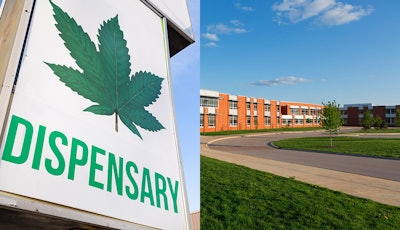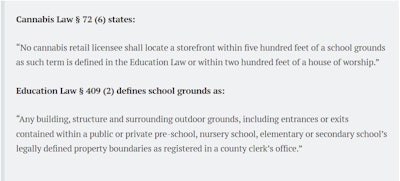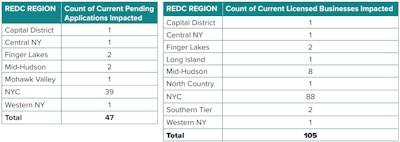
The New York Office of Cannabis Management (OCM) issued a proximity correction on July 28 that impacts 105 licensed dispensaries and at least 47 pending applicants related to their distances from schools.
The OCM determined that its staff erred in approving locations for these 152 retailers/aspiring retailers through guidance that the office established in 2022, which includes measuring the state’s entrance-to-entrance distance between a dispensary and school. Under state law, cannabis dispensaries must be at least 500 feet from schools.
However, OCM officials said this week that their 2022 entrance-to-entrance guidance is not consistent with the Marijuana Regulation and Taxation Act (MRTA) that former Gov. Andrew Cuomo signed into law in March 2021. Instead, they said, the distance must be measured from a dispensary’s main entrance to the “nearest property line boundary of a school’s ground.” This is a straight-line measurement.

“Reading these sections of law together, a cannabis retail dispensary cannot be within 500 feet of a school’s property line,” according to the OCM’s July 28 overview of the correction. “The office has contacted impacted licensees and applicants by phone and by letter/email with detailed information about the practice correction and timeline.”
The impacted businesses/applicants are primarily located in New York City, including 88 of 105 licensees and 39 of the 47 pending applications, according to the OCM.
 New York Office of Cannabis Management
New York Office of Cannabis Management
As of July 25, there were 436 licensed adult-use dispensaries in the state, including 177 in the smallest geographic region: New York City.
OCM Acting Executive Director Felicia Reid notified state regulators that the affected businesses include 60 dispensaries that are already open, with the other 45 impacted licensees actively working toward opening their doors, The New York Times reported. The Times received a copy of Reid’s communications with her staff and the impacted businesses.
“To give you this news, and for the weight of it, I am incredibly sorry,” Reid wrote to those impacted.
While the Times initially reported that the OCM is “forcing” 152 cannabis retailers to find new locations after the administrative review of its 2022 guidance, the OCM disputed that word choice.
“Facts matter. This is not accurate,” OCM officials wrote on X. “The office is not forcing 152 cannabis retailers to find new locations.”
The OCM and Gov. Kathy Hochul’s office will be proposing and “aggressively pursuing” a legislative fix for licensed dispensaries whose locations conflict with state law, according to the OCM’s correction overview.
“This legislation would permit licensees to remain at their present licensed location,” according to the overview. “Importantly, passage of proposed legislation is the prerogative of the New York State Legislature and is not a guarantee.”
In the absence of that legislative fix, the OCM cannot renew permits for the 105 already licensed retailers. In the meantime, dispensaries can remain open until their licenses are up for renewal, according to the OCM.
In other words, the OCM is attempting to grandfather in dispensaries that are already open, but only state lawmakers can make that call.
Meanwhile, the OCM is requiring the 47 pending applicants who are impacted by the office’s miscue to find new locations before moving forward in the application process.
To “lessen the burden” of the OCM’s correction, the office is working with Hochul’s office and the Empire State Development to create a $15 million relief program, from which the applicants can seek up to $250,000 each in coverage to help find new locations or to make capital improvements to their original locations.
“Applicants will still be able to pursue licensure, even if they participate in the [relief] program, but they must find a new location before moving ahead in the application process,” according to the OCM.
The office will also work with these applicants through provisional licenses and extensions on current provisional licenses, according to the OCM.
Damian Fagon, the OCM’s former chief equity officer, who resigned in November following an investigation of unsubstantiated allegations against him, took issue with the $15 million relief program for license applicants, the Times reported.
“A politically motivated rule reversal is now diverting another $15 million from the very communities the law was written to help repair,” he said.
OCM officials said that as their analysis continues, they could identify additional applicants or retail licensees who will be impacted by their correction. If so, the office will contact them directly.


























